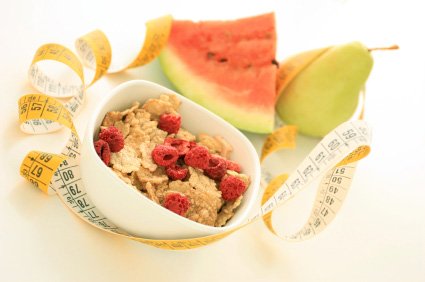|
Low calorie vegetarian diet
Low calorie vegetarian dieting is all about measuring - and reducing - the quantity of food energy you consume each day. It's simple physics - less energy (food) going in than is used up, means an overall reduction in the energy stored in the system (ie weight/fat stored in YOU!) So what's a calorie anyway, and what are you supposed to do with one? Well, a calorie is a scientific unit, and actually defined as the amount of energy required to raise the temperature of one kilogram of water by one degree (at one atmosphere pressure, for the sake of scientific completeness). In other words, it's a unit of energy - and as every GCSE science student knows, energy takes many forms (eg heat, motion etc) but in the case of weight loss we are talking about energy stored within food OR the human body - as fat. To plan a low calorie diet, you need to be aware of the amount of calories your body requires as as baseline, ie when doing nothing, and also the calorie content in foods you regularly eat. Then you can work out how to reduce your weight steadily by curbing your calorie intake over a period of time, to deliver safe, healthy and sustainable weight loss. Incidentally, the units we generally refer to in a shorthand way as 'calories' are actually 'kilo-calories' - a thousand calories - generally abbreviated to 'kcal'. Another unit food energy is measured in is joules, these are completely different - just as valid but as different (and non-interchangeable!) as miles and kilometers. It's important to stick with one way of counting, if you want to make your low calorie vegetarian diet work for you in a practical sense. If you don't want to do any arithmetic, you can of course opt for one of the many calorie-controlled commercial diets available, or create your own using calorie counts displayed on food packaging. For example a medium-build adult female is generally described as needing between 2000 and 2500 calories per day - so following a 1800 calorie diet / using a 1800 calorie diet menu should allow for steady weight loss. Some programmes recommend a 1000 calorie diet menu, which would lead to faster weight loss, and indeed most experts would NOT recommend consuming less than this without medical supervision (see our meal replacements / very low calorie diets section. The other side of the calorie controlled diet equation of course involves increasing the number of calories you burn off - and there are many health advantages associated with becoming more active, alongside your desired benefit of losing weight faster, so we really hope you will read all these pages and work out the best route forward for you. We also explore the 'negative calorie diet plan' and examine the truth behind the hype - there's more sense there than it sounds, and surprisingly vegetarian-friendly too. Finally to help all of us low calorie vegetarian dieters, we have prepared a list of snacks containing less than 100 calories, to help plan, measure and succeed with your weight loss plan. We're constantly checking out new plans and options for low calorie veggie dieting so please do sign up for our ezine - bringing you monthly recipes, tips, advice and inspiration, on every aspect of vegetarian weight loss success!
|






